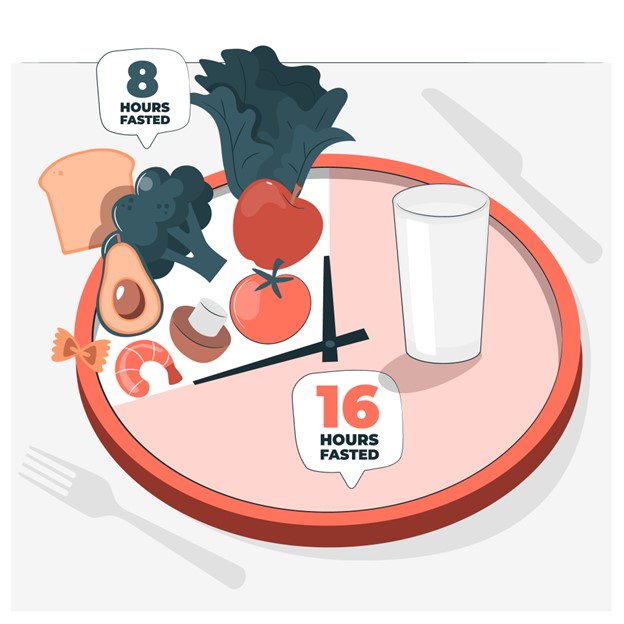What is it about intermittent fasting that has everyone talking? This dietary approach has become super trendy recently, especially among health buffs and celebrities. The word has spread about its potential perks for weight loss and overall health improvement. But what is it, really, that keeps so many people buzzing? Why do folks feel like it’s something worth trying out for themselves?
Through this piece, we’ll help pull back the curtain on myth and facts on intermittent fasting. With so much information around, figuring out what’s true can be tough. We’re here to debunk myths about intermittent fasting while explaining facts about benefits of fasting. You’ll leave this article with tips to start your fasting journey wisely and enjoyably.
Fasting is said to help with losing those extra pounds and enhancing metabolism. Studies hint that it might help balance insulin levels, aiding those with high sugar concerns. Yet, it’s vital to remember every silver lining has its cloud. Skipping meals can cause headaches or mood changes, and could lead to bigger health woes for some. A fair and even outlook is crucial when thinking of starting a fasting routine.
Understanding Intermittent Fasting: Basics and Benefits
Intermittent fasting is all about timing when you eat or don’t. It isn’t about cutting certain foods but limiting when meals are. Traditionally, dieting often demands counting every calorie and constant control. In comparison, intermittent fasting provides a simple way to manage eating.
Human beings have always had natural cycles of eating and fasting. Before modern conveniences, people ate only when they could get food. This pattern helped align them with natural rhythms that often enhanced health. Bringing back this eat-and-fast cycle benefits digestion and metabolism today.
Most people start intermittent fasting for weight loss and notice quick results. But there are other health benefits like improved blood sugar levels, too. Fasting can improve metabolism rate, enhancing how the body functions overall. People often find reliable truths in how fasting helps weight loss while enjoying other perks.
Exploring Different Intermittent Fasting Schedules
People usually start with the 16/8 fasting method, which means they fast for 16 hours and eat during an 8-hour frame. This approach fits well into daily routines, though some prefer the 12-hour fasting schedule, even if results may appear slower. The eat-stop-eat plan involves fasting for a full day once or twice weekly, allowing flexibility and convenience. Each method should fit seamlessly into your routine to ensure commitment and enjoyment.
The 5:2 diet allows normal eating for five days while cutting calories significantly on two non-consecutive days. As another option, alternate-day fasting involves going without food every other day, creating balance and routine simplicity. Both methods cater to beginners’ preferences without overly rigid measures. It’s smart to pay attention to your body’s responses and pick what feels natural.
Some choose intuitive fasting by skipping meals when they’re not hungry, making the process feel more organic. The warrior diet has one consume light snacks of raw produce by day and a big meal at night. It imitates ancient habits, suiting those who prefer unique approaches over traditional times. Such variety in fasting reflects individual needs and encourages experimentation with different fasting styles.
Scientific Benefits of Intermittent Fasting
Fasting can help manage weight well. It reduces the time for eating, so people eat less. Plus, fasting helps insulin work better for controlling blood sugar levels. This often aids in managing weight and lowers type 2 diabetes risks. By knowing the myth and facts on intermittent fasting, many start fasting confidently.
Intermittent fasting can boost both brain health and memory. The brain becomes sharper and handles stress better during fasting. Many feel more energetic with stable blood sugar levels or higher growth hormones. This energy boost appeals to those new to fasting programs.
Fasting leads to good body cell repair and growth. It removes old cells while allowing new ones to form, called autophagy. During fasting, stored fat becomes the main fuel source, promoting energy use and fat loss. Fasting affects metabolism positively, making it popular for its fat-burning benefits.
Debunking Myths: Separating Fiction from Facts
Intermittent fasting is sometimes unfairly criticized, especially regarding muscles. It’s said by some that one loses muscle if they don’t eat regularly. This isn’t true if you stay active with exercises like weightlifting. Many myths and facts on intermittent fasting are guided by exaggerated stories.
People often fear that fasting causes eating disorders and hormonal problems. But studies typically suggest otherwise for most individuals. With a well-structured fasting routine, it actually can help control hunger and reduce impulse eating.
There is a lot of chatter about intermittent fasting myths and truths today. It’s crucial to trust information from research instead of rumors alone. Though not perfect for everyone, many find a healthier way of eating through fasting. The true facts about intermittent fasting benefits highlight its positive effect worldwide.
Understanding Possible Side Effects and Risks
Embracing intermittent fasting can be tricky at first. Beginners often feel hungry and sometimes experience headaches. Some report fluctuating moods too. These effects tend to fade away as your body gets used to the new eating routine. It’s important to be patient and keep drinking enough water every day.
Low blood sugar, or hypoglycemia, is a more serious concern. If you have ongoing health issues or are pregnant, fasting might not be safe. Should unusual symptoms occur, changing your fasting method or speaking with a doctor is advised. Prioritizing one’s well-being always comes first.
Recognizing that everyone’s body reacts differently to fasting is key. For some, adapting comes easily, while others may find it tougher. Checking how you feel can help shape a suitable fasting schedule. Forming a connection with your body helps handle potential fasting challenges better.
Tips for Beginners: Starting Your Intermittent Fasting Journey
Many find starting intermittent fasting overwhelming, but it’s quite manageable. Try the 16/8 method—fast for 16 hours, then eat during an 8-hour window. It’s less intimidating and includes your sleep hours in the fast.
Keeping hydrated while fasting is crucial for beginners to remember. Drink water, herbal teas, or black coffee to help fight hunger pangs. Listen to your body; it tells you what it needs to feel well. Feeling dizzy or overly tired might mean your body needs a break.
Eating quality food during meal times matters a lot in fasting. Choose fresh fruits, vegetables, lean proteins, and whole grains for nutrition. This way, you enjoy benefits while keeping your body nourished with essentials.
Who Should Avoid Intermittent Fasting
Intermittent fasting isn’t a good idea for everyone. People who have dealt with eating problems should avoid it. Fasting might bring back those old unhealthy habits again. Those with health issues like diabetes should be careful. It’s best to check with a doctor first before starting a fast.
Pregnant women shouldn’t try fasting due to extra nourishment needs. Expecting mothers need more balanced nutrition for them and the baby. Teens also might not do well because their bodies are still growing. They need to focus on nutritious meals instead of fasting techniques.
Before you start any fasting plan, talk to a health expert. A personalized checkup can help decide if fasting benefits suit your body. This way, you know if the truth about intermittent fasting applies safely and aptly for you.
Conclusion: The Journey Towards Informed Fasting
Intermittent fasting can bring many advantages for health when practiced right. It’s always wise to start gradually and understand what suits your body and lifestyle.
The great thing about intermittent fasting is its flexibility in fitting into different lives. You can adjust the schedules based on individual daily routines and dietary preferences.
Consulting with a healthcare professional before starting fasting is very important. They provide guidance on weight loss with intermittent fasting and help maintain safety.


